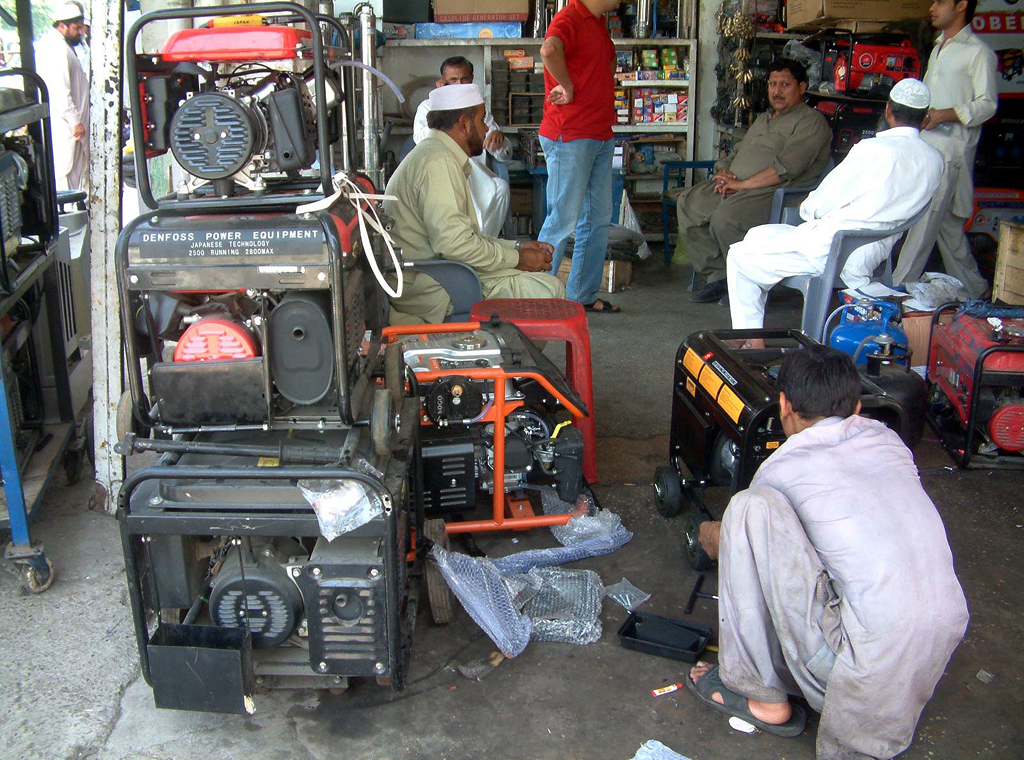
With summer fast approaching, the residents of Karachi are likely to suffer hours of load-shedding in coming months. While many will painstakingly wait for power supply to resume, others will turn on their generators and continue with their life.
The convenience that comes with having a generator makes it easier to ignore how running them even for a few hours makes the air we breathe harmful. Emitting toxic gases such as oxides of nitrogen and sulphur among other dangerous compounds, generators are a threat to the health of everyone around them.
Faulty generator leaves tourists hanging
“Running a generator regularly in a house is not only harmful to the family but anyone who is nearby including the neighbours because fumes travel freely,” says Dr Zafar Fatmi, associate professor at Aga Khan University.
Fatmi, who heads the research group for environmental health at the university, says people who stay at home such as housewives and young children are mainly at risk. “There are chances of having lung and cardiovascular diseases,” he states.
The threat to health, Fatmi says, depends on the level of exposure. “The placement of the generator is very important; putting it in an enclosed space leads to high level of exposure and increases the risk,” he says.
Load-shedding sparks debate in Sindh Assembly

The Aga Khan professor says running generators for four to six hours every day results in a high level of exposure.
Syed Kamran Haider Naqvi, an urban specialist at the International Union for Conservation of Nature (IUCN), says the level of pollution is directly linked to the type of generator - petrol, diesel or gas, brand and country of origin. “The emission can be reduced by proper maintenance plus gas powered generators perform better environmentally as compared to petrol or diesel-powered ones,” he says.
The specialist also recommended using smaller generators to reduce air and noise pollution. “Maximum 5KVA generators are advisable for domestic use,” Naqvi says.
For Karachi’s residents: MQM protests against load-shedding
The IUCN expert points out that generators used at home are also a source of noise pollution as their sound exceeds permissible level for residential areas.
Sindh Environmental Protection Agency (Sepa) director-general Naeem Ahmed Mughal says though he hasn’t received any complaint against generators run inside houses or apartments, his team is gathering data on generators used in commercial areas. “This falls under the domain of indoor air quality and whatever we learn and plan during this exercise can be applied to regulate use of generators in residential areas in the future,” Mughal says.
The Sepa official says Karachi has seen a rapid rise in the use of generators due to shortfall in electricity. “We cannot stop people from using generators because they will use alternatives to meet their energy demands but what we can do is study the problem, strategise and inform the public,” Mughal states.
“We can set criteria for how and where the generators should be placed to reduce the threat,” he added.
Referring to certain houses that run on solar energy in Defence Phase VIII, Mughal says all possible ways of fulfilling energy needs will have to be considered before a strategy is drafted to tackle the issue. “In future, we can also work with the building authorities and ask them to only approve plans that are energy-efficient,” he suggests.
Mughal adds buildings should be discouraged from offering the much-touted facility of ‘stand-by generators’ and advised to use the roof space for installing solar panels.
“To tackle this environmental issue, we need to take a holistic approach,” he stressed.
Published in The Express Tribune, February 24th, 2016.




















-(1)1714116455-0/Heeramandireactions-(2)-(1)1714116455-0-270x192.webp)






1714024018-0/ModiLara-(1)1714024018-0-270x192.webp)









COMMENTS (2)
Comments are moderated and generally will be posted if they are on-topic and not abusive.
For more information, please see our Comments FAQ